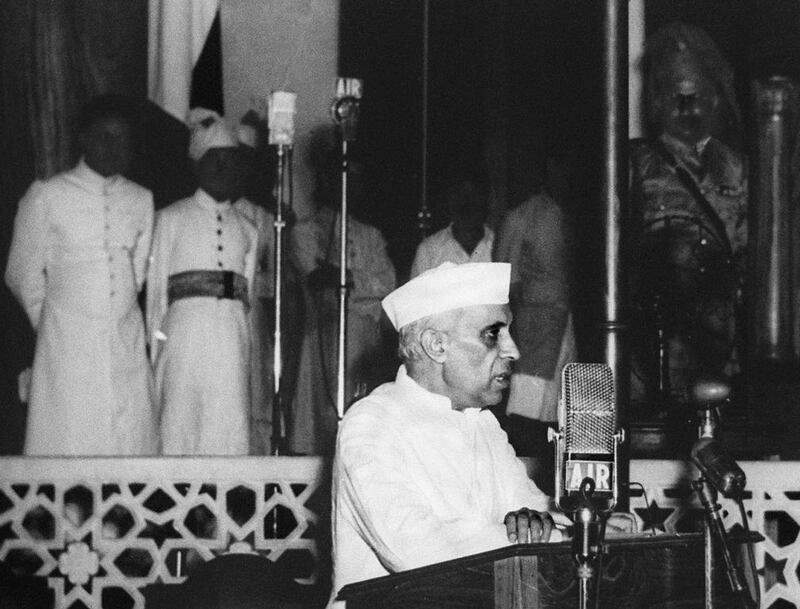NEW DELHI // The 125th anniversary of the birth of Jawaharlal Nehru, India’s first prime minister, has sparked an unexpected political tussle over his legacy, with the country’s leading political parties vying to honour his memory.
Nehru, a freedom fighter and a key architect of the modern Congress party, served as prime minister from India’s independence in 1947 until his death in 1964.
The Congress has always claimed to be the sole inheritor of Nehru’s ideals, even as its rival, the Bharatiya Janata Party (BJP), has looked to other historical figures — particularly on the Hindu right — for ideological support.
This year, however, the Congress and the BJP-led government appear to be in competition to celebrate Nehru’s life — as seen in two Nehru seminars held within days of each other in Delhi.
A two-day conference organised by the Congress party, which ended on Tuesday, hosted 55 delegates from 12 countries. Conspicuously, however, it featured no representative from prime minister Narendra Modi’s government.
Sonia Gandhi, the party’s president, was quick to make the distinction between Nehru’s dream of a secular India and the BJP’s vision of the country as a Hindu nation. “Secularism was and remains more than an ideal,” Ms Gandhi said in a speech at the conference on Monday. “It is a compelling necessity for our country.”
For their part, Mr Modi and the BJP have been surprisingly strong in their praise for Nehru.
A year ago, Mr Modi had said that he wished another Gujarati, Sardar Vallabhbhai Patel, had become India’s first prime minister. “If it had been so, then the face and the fate of the country would have been something else. Patel was a visionary.”
But last month, while spreading the message of his Clean India drive, Mr Modi said the campaign was “for children whom Nehru loved”.
Children’s day in India is celebrated on Nehru’s birthday every year.
“When we celebrate the 125th birth anniversary of Nehru on November 14, all schools should give lessons on cleanliness to the children,” he said.
Mr Modi also headed the government panel overseeing the official celebrations of Nehru’s birth anniversary, which began with a seminar last Friday at the state-funded Nehru Memorial Museum and Library.
In lauding Nehru, Mr Modi has gone against the institutional beliefs of the BJP and its allied organisations of the Hindu right, such as the Rashtriya Swayamsevak Sangh (RSS). The RSS has traditionally despised Nehru, blaming him for the brief ban imposed upon the group from 1948-1949.
India’s home minister Rajnath Singh, called Nehru a “nation-builder” in his opening address at the seminar, praised his leadership, and noted that he bore no personal animosity towards political rivals.
“India cannot be ruled with a narrow mind,” Mr Singh said, in veiled reference to the Congress party. “Nehru understood this fact fully… Nehru had faith in Indian democracy and [understood] that this is not a democracy for the elite only.”
Madhav Khosla, a political science scholar at Harvard University and the editor of a recently published compilation of Nehru’s letters, observed that “there are many ways to look at what the BJP is currently doing, ranging from sheer political opportunism to Modi trying to be above politics”.
But the BJP is able to stake some claim to Nehru, Mr Khosla told The National via email, only because "the door has been left open for them by the Congress, which has done nothing at all for Nehru's legacy for years".
Srinath Raghavan, a historian with the New Delhi-based Centre for Policy Research, pointed out that the Congress had, over the years, reduced Nehru down to his secularism, his socialism and his scientific temper — qualities that it believes the BJP does not possess. But Mr Modi’s praise for Nehru could have the effect of making the BJP look like a more inclusive political party.
"But the very fact that Modi can even do this — connect himself to Nehru in this way — shows that there was more to Nehru than that," he told The National.
In Mr Modi’s praise for Nehru, Mr Raghavan saw continuity from his election campaign earlier this year, during which he tried to reach out to people beyond the BJP’s core base of conservative Hindus.
“That’s the challenge for him now — to command larger and large circles of acceptance,” he said. “The core base from the Hindu right, in any case, is securely with him and the BJP now. Where else will they go?”
In this tussle over Nehru, it may have been the Congress that has been outflanked.
“Right now, by holding its own seminar and not inviting anybody from the government, the Congress is coming across as more parochial, insisting that Nehru belongs only to them,” Mr Raghavan said. “Whereas Modi is saying he’s beyond all that, that he’s a national figure. He’s playing his cards astutely.”
ssubramanian@thenational.ae





